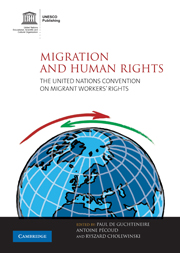Book contents
- Frontmatter
- Contents
- List of figures
- List of tables
- Notes on contributors
- Abbreviations
- 1 Introduction: The UN Convention on Migrant Workers' Rights
- PART I
- PART II
- 7 Obstacles to, and opportunities for, ratification of the ICRMW in Asia
- 8 Obstacles to ratification of the ICRMW in Canada
- 9 Mexico's role in promoting and implementing the ICRMW
- 10 Migrants' rights after apartheid: South African responses to the ICRMW
- 11 Policy on the ICRMW in the United Kingdom
- 12 The French political refusal on Europe's behalf
- 13 Migration and human rights in Germany
- 14 Migration and human rights in Italy: prospects for the ICRMW
- 15 The ICRMW and the European Union
- Annex 1 International Convention on the Protection of the Rights of All Migrant Workers and Members of Their Families Adopted by General Assembly Resolution 45/158 of 18 December 1990
- Annex 2 Ratifications of ILO Conventions 97 and 143 and of ICRMW as at June 2009
- Index
- References
14 - Migration and human rights in Italy: prospects for the ICRMW
Published online by Cambridge University Press: 02 December 2010
- Frontmatter
- Contents
- List of figures
- List of tables
- Notes on contributors
- Abbreviations
- 1 Introduction: The UN Convention on Migrant Workers' Rights
- PART I
- PART II
- 7 Obstacles to, and opportunities for, ratification of the ICRMW in Asia
- 8 Obstacles to ratification of the ICRMW in Canada
- 9 Mexico's role in promoting and implementing the ICRMW
- 10 Migrants' rights after apartheid: South African responses to the ICRMW
- 11 Policy on the ICRMW in the United Kingdom
- 12 The French political refusal on Europe's behalf
- 13 Migration and human rights in Germany
- 14 Migration and human rights in Italy: prospects for the ICRMW
- 15 The ICRMW and the European Union
- Annex 1 International Convention on the Protection of the Rights of All Migrant Workers and Members of Their Families Adopted by General Assembly Resolution 45/158 of 18 December 1990
- Annex 2 Ratifications of ILO Conventions 97 and 143 and of ICRMW as at June 2009
- Index
- References
Summary
Introduction
This chapter aims at highlighting why Italy has not yet ratified the ICRMW, on the basis of interviews with various representatives of Italian society who in one way or another have dealings with migrants' rights: trade unions, NGOs, politicians and academics. It focuses on different kinds of possible obstacles (cultural, social, legal and political) and aims to show what role each of these categories plays in the non-ratification of the Convention. The research is largely based on interviews, as the Convention does not receive a great deal of attention from the academic community in Italy and thus very few sources are available on this subject.
Italy, as with many other developed countries faced with the absence of a willing domestic workforce, increasingly looks outside its borders for low-skilled workers. Migrant workers and irregular migrants from poorer countries have stepped in to fill the demand. In addition, receiving countries concerned with deregulating the labour market and making it more flexible have made it easier for cost-conscious and competition-minded employers to exploit migrant workers – at the expense of formal employment and human rights protections. This is especially true as the informal sector or ‘underground economy’ has expanded in wealthy countries, providing increased risks and rewards for immigrants (Cholewinski, 2005). As shown below, the underground economy is rather significant in Italy, and this has been identified during this research as one motive for not putting into place a legal framework granting rights to irregular migrants.
- Type
- Chapter
- Information
- Migration and Human RightsThe United Nations Convention on Migrant Workers' Rights, pp. 343 - 359Publisher: Cambridge University PressPrint publication year: 2009
References
- 2
- Cited by



